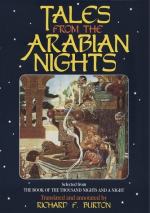and stroke of sword in fair field and patent plain.
If any can do this, I will willingly wed him; but,
if I overcome him, I will take his horse and clothes
and arms and write with fire upon his forehead, ‘This
is the freed man of Al-Datma.’” Now the
sons of the Kings flocked to her from every quarter
far and near, and she overcame them and put them to
shame, stripping them of their arms and branding them
with fire. Presently the son of a King of the
Kings of the Persians, by name Behram ibn Taji, heard
of her and journeyed from afar to her father’s
court, bringing with him men and horses and great
store of wealth and royal treasures. When he
drew near the city, he sent her parent a rich present
and the King came out to meet him and honoured him
with the utmost honour. Then the King’s
son sent a message to him by his Wazir, demanding
his daughter’s hand in marriage; but the King
answered, saying, “O my son, as regards my daughter
Al-Datma, I have no power over her, for she hath sworn
by her soul to marry none except he overcome her in
the listed field.” Quoth the Prince, “I
journeyed hither from my father’s court with
no other object but this; I came here to woo and for
thine alliance to sue;” quoth the King, “Thou
shalt meet her tomorrow.” So next day he
sent to bid his daughter who, making ready for battle,
donned her harness of war, and the folk, hearing of
the coming joust, flocked from all sides to the field.
Presently the Princess rode into the lists, armed
cap-a-pie and belted and with vizor down, and the
Persian King’s son came out singlehanded to meet
her, equipped at all points after the fairest of fashions.
Then they drove at each other and fought a great while,
wheeling and falsing, advancing and retreating, till
the Princess, finding in him such courage and cavalarice
as she had seen in none else, began to fear for herself
lest he put her to shame before the bystanders and
knew that he would assuredly overcome her. So
she resolved to trick him and, raising her vizor,
lo! her face appeared more brilliant than the full
moon, which when he saw, he was confounded by her
beauty and his strength failed and his spirit faltered.
When she perceived this, she fell upon him unawares
in his moment of weakness, and tare him from his saddle,
and he became in her hands as he were a sparrow in
the clutches of an eagle, knowing not what was done
with him for amazement and confusion. So she
took his steed and clothes and armour and, branding
him with fire, let him wend his ways. When he
recovered from his stupor, he abode several days without
meat or drink or sleep for despite and love of the
girl which had taken hold upon his heart. Then
he sent a letter by certain of his slaves to his father,
advising him that he could not return home till he
had won his will of the Princess or died for want
of her. When his sire got the letter, he was
sore concerned for his son and would have succoured
him by sending troops and soldiers; but his Wazirs




